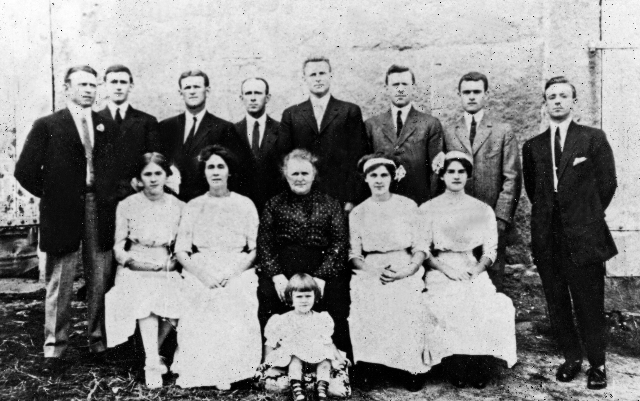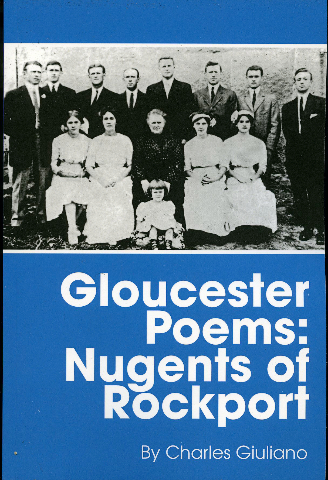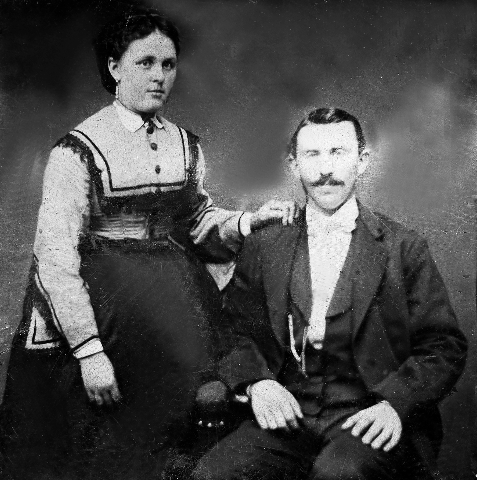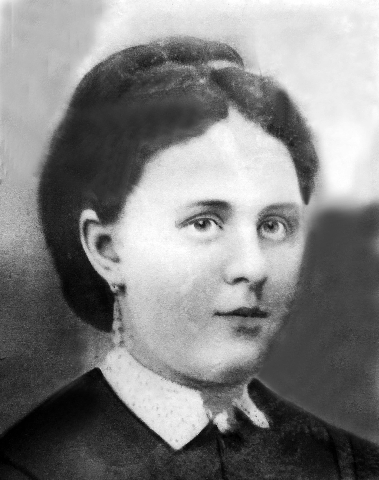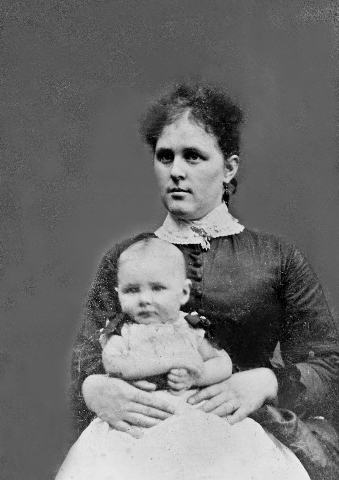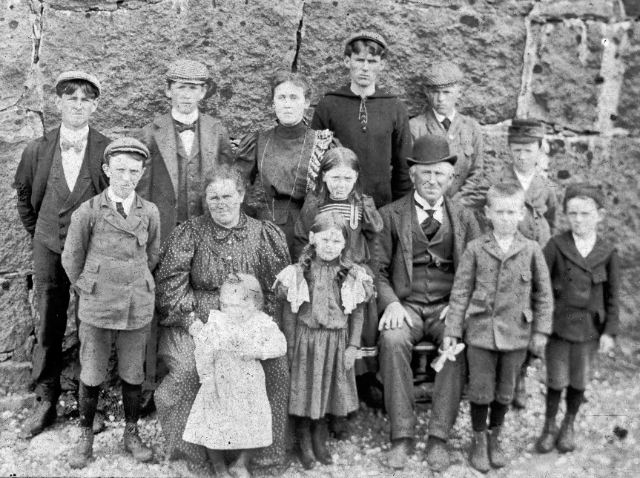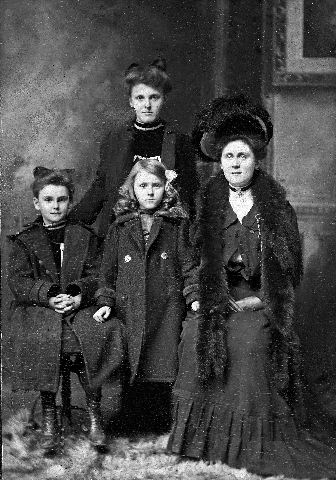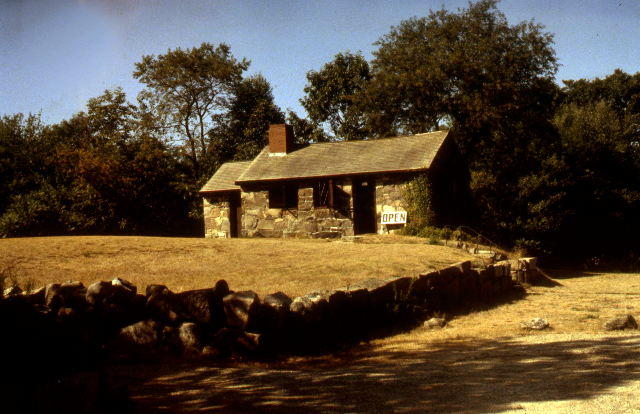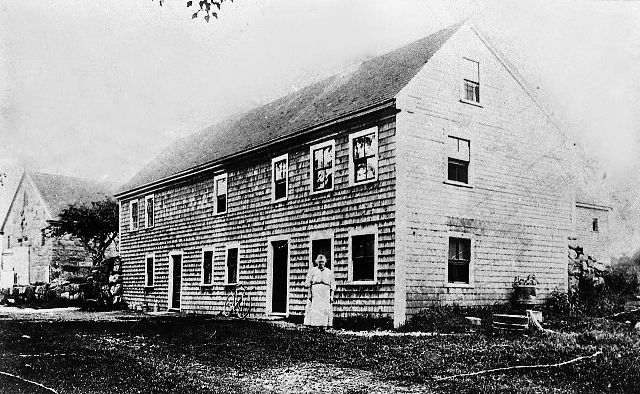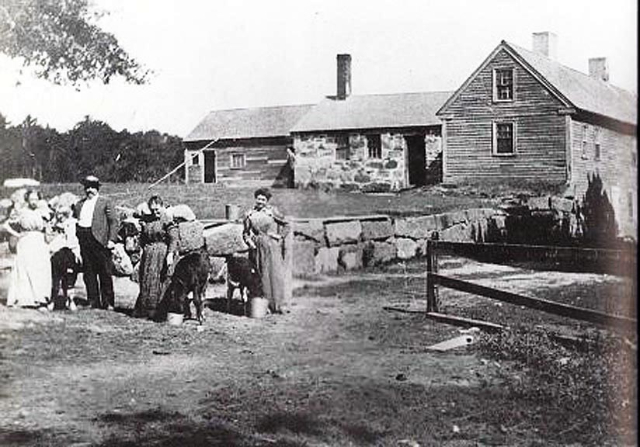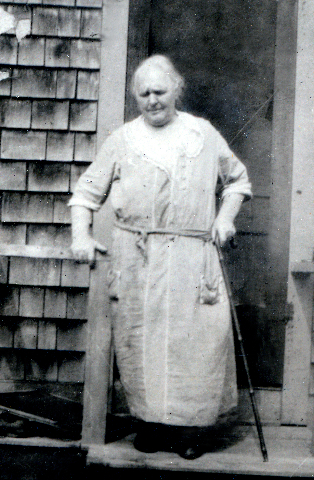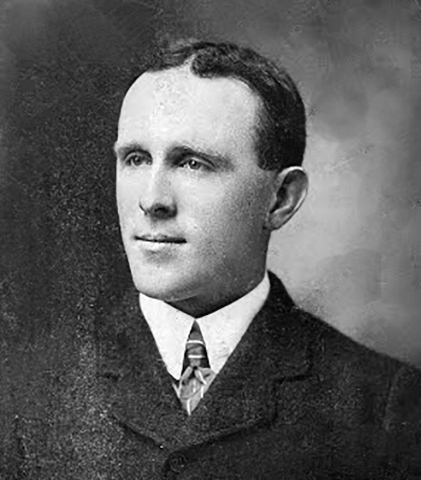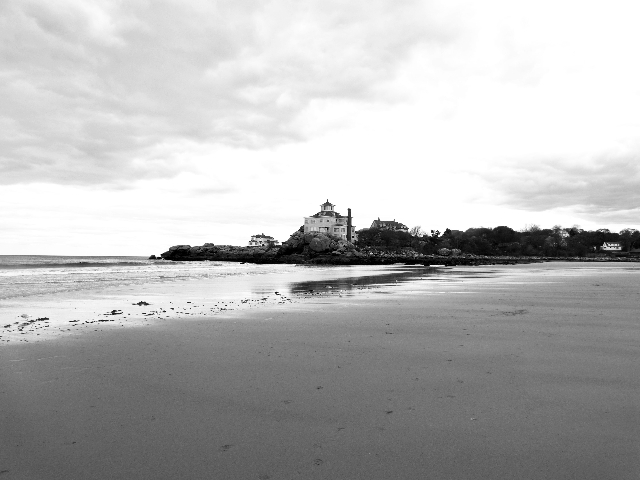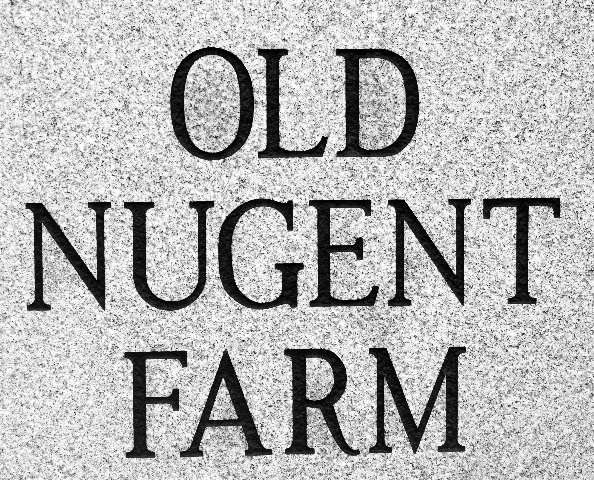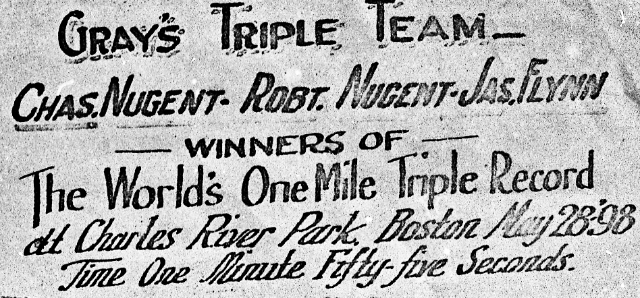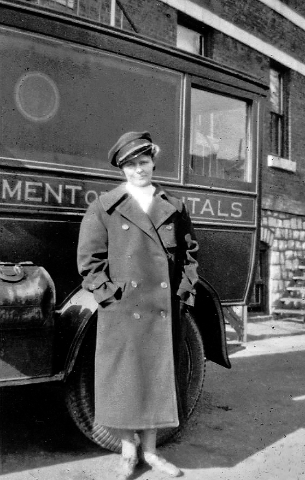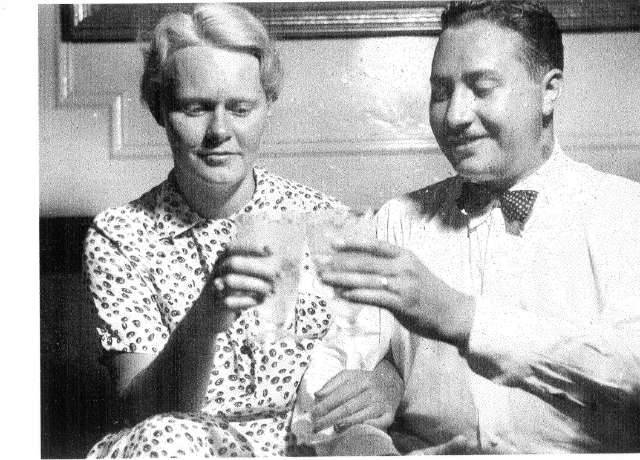Nugents of Rockport
Patrick and Mary Raised Thirteen on Beaver Dam Farm
By: Charles Giuliano - Aug 16, 2017
What follows is the chapter "On the Road" from Gloucester Poems: Nugents of Rockport, published, August, 2017, 375 pages, illustrated.
Charles Giuliano We're on our way home from Florida.
Josephine Rita Flynn May 5, 1986. It's a Tuesday.
CG I want you to tell me the story of your life. Let's start with the Nugent family in Rockport.
JRF I was born in Gloucester October 7, 1907.
CG I thought October first was your birthday.
JRF You're right. I'm getting flaky. (laughs)
When I was three or four I remember going to spend a good part of the summer with my grandmother on Beaver Dam Farm (Rockport).
CG There is a photo of the Nugent Family on the farm. You are in the front row and look to be about three or four. So that would date the photo to about 1910.
JRF Arthur was a babe in arms (a later photo). That caused a lot of hard feelings because my mother was in the back row with the single women. There were three children in the front row. It was a Sunday afternoon and they had a photographer come down. The family got dressed for the picture and stopped working for awhile. On that Sunday Uncle Frank was on and Uncle Billy was on. We happened to have a family reunion.
They had cattle at least 20 cows for milking. Today that's Nugent Stretch in Rockport.
CG Who was Patrick Nugent? He was dead by the time you were born.
JRF I never knew him. He and my grandmother both came from Ireland. They landed in Boston and he met her here. They lived in Charlestown. She was Mary Josephine Donovan. I imagine at first she worked as a domestic. That was about all a woman could do at that time. They rented Beaver Dam Farm.
CG From the Babsons?
JRF No from the Hawkes I believe it was. On the farm my grandmother had nine sons and four girls. There was Charlie, Rob. Charlie was the oldest. I think he was born in Charlestown and my mother (Josephine), the next was born in Rockport. Frank, Billy, Henry, Joseph, George the youngest, Jack. Can't think of the ninth one offhand. Then the girls. My mother was the oldest. Then Julia, Mary and Catherine, Aunt Caddy as we called her, was the youngest.
They had milking cows and would deliver the milk twice each day. I remember them scrubbing down the milk house. Everything had to be sterile. It was a working farm and everyone did their chores.
I was just a little girl and my chores were to play and keeping out of trouble.
They cut their own hay for the winter; salt hay and the regular hay. During the summer they gave fodder, which was bright green, to the cows. Up in the woods they had a pig farm in Dogtown Common. They slopped their own pigs. They had a bull pen. They did their own mating with the cows.
When you visit the farm today all that's left was the stone kitchen. (Babson Museum)
CG Was it a big house?
JRF Oh yes. It was a three story house. On the ground floor there was the winter kitchen. The summer kitchen was the stone kitchen.
CG Tell me about the sons.
JRF Georgie stayed on the farm and was left it by Grammy.
Charlie was a farmer all his life. He lived at Beaver Dam. He married late in life. He had four children and they all stayed in Gloucester. Rob stayed in Gloucester and worked for the telegraph company. He married Molly Gibbs but they didn't have children. He was killed in a motorcycle accident. Jack, that's Millie's father, he was killed by a horse. He was up in Gloucester and it was a new horse they had. He got thrown into a telegraph pole and killed.
Rob was driving the motorcycle down Nugent Stretch with someone on the back. A sweater got caught in the spokes and he was killed.
Uncle Henry went to Vancouver where he was in the awning business. He went west. What did Horace Greeley say "Go west young man." He married Marjorie and they had a son and daughter. His wife is still living.
Uncle Frank went to the University of Toronto veterinarian school. He practiced in Newcastle, Pennsylvania. He was a character you would love. Oh, you would love him. He was a big talker. He had one adopted daughter, Mary Rupp Nugent.
Uncle Billy went to New York and then Atlantic City. He was a contractor and they did well. His boys followed suit. One became a lawyer but the others all went into contracting. First they graduated from college. I guess he had seven or eight children. I have to think of the names of them.
When Grammy died I think she had 27 grandchildren.
Aunt Julie married Harold Aaron Huckins and had two boys Bobby and Junior.
CG I recall that Junior came to visit you from time to time.
JRF Aunt Caddy married George Gibbs but they didn't have any children.
(George Gibbs was in the Army band as a drummer during WWI. He was president of the Boston Musicians Union. He later joined the national union as a vice president in New York under James Petrillo. They lived in New York and Belmont.)
Your grandmother, Josephine, had four children; Josephine, Arthur, Mary and James (Brother). We were spaced pretty well with about three and a half years between us. Maybe more between Mary and Brother. We were well spaced. We weren't zoom, zoom, zoom.
Mary Nugent was a young girl when she died of tuberculosis. She was about eighteen or so. Apparently, she was infected by milk or something but they tested the cows. They would put drops in their eyes and if they got red they could carry tuberculosis. They had to be quarantined or done away with.
They had raw milk. It wasn't pasteurized at that time.
CG Was she ill a long time?
JRF Maybe for several months. It hit her intestines.
CG Do you remember her?
JRF Oh yes, she was beautiful. She was a lovely girl with dark hair and blue eyes, very pretty with lovely features.
On the whole the family had reddish/ blond hair. Some of them were dark. My mother was dark haired.
Down there it was open house all the time. Anyone could come and visit and stay as long as they wanted. When they came everyone pitched in. If it was a man he got into a pair of dungarees and went out haying in the morning. They didn't let them milk the cows because they would be too slow. The women would make pies and cakes.
In those days we had washing out in the back yard. We had galvanized tubs up on a stand. One with soapy water and one with rinse water. They bought soapine, a powdered soap, by the barrel. There was a wash board for scrubbing and you had the clothes lines. You dumped the water right over the lawn. There was no running water. It was well water. There was a pump in the kitchen. You kept a pitcher of water on the sink to prime the pump.
The toilets were outdoors. You walked through the wood shed and there were five toilets lined up. Different sizes with small ones for the children. It was nothing to have them all occupied at once. Chatting away. Yes. That was a place to go.
CG Must have been awful stinky.
JRF No it wasn't. It was a different odor not like bathrooms today. They put lye down the toilets. That took away the odor. The honeyman would come every few months and dig it all out. Today we have our cesspool drained.
Saturday night we took baths. We washed our hands and feet every night. There were no showers so we were lucky to get that bath each week. It was in the kitchen. Everyone would go to Gloucester on Saturday night. All the young people were standing out on the street corner in front of the drug store. We would do a little shopping. Be seen and dressed up. That was a big adventure. There were open cars that would ride around the Cape. It would stop in front of the house. The seats would go all across. It was a thrill to go up to Gloucester in the open car.
Mostly the adults would take their bath in the back or out house as they called it. Grammy would go first. It would take a couple of people to lift those tubs and empty them in the sink. You boiled the water. The kids took turns and had a bath in the same water. It wasn't that bad because we washed up every night.
There was a bucket of soapy water by the door to wash up before you came into the house.
On Sunday we dressed up which meant putting shoes and stockings on.
Jim Nugent is the one I left out. He stayed in Gloucester. He was Jeanne Nugent's father. He was a very dignified man. He was a little lame and used a cane. We always called him Reginald.
(Jeanne Nugent, who lived on Marble Road, taught art at Gloucester High School.)
CG Tell me about your grandmother.
JRF It was quite a traumatic thing when they all left the farm. She moved to Mt. Vernon and Prospect Streets. George bought the Shepherd Farm across the street facing Good Harbor Beach. It was more modern and up to date.
(George Nugent operated a dairy and pig farm. The land originally included all of Good Harbor Beach. After many years of legal action the beach was sold to the City of Gloucester. The Nugent Farms development is located on the property. The family was embezzled and lost the property as well as considerable assets.)
The family had leased Beaver Dam farm all those years. (Until the 1920s. After it was abandoned it was burned down by hooligans.)
CG Where do the Babsons come in?
JRF They claim to have built the stone kitchen as a cooperage. That was way before the farm was built. It was a three story building with at least ten bedrooms. That was built when my grandmother first moved to the farm. I guess she planned to have a big family.
I used to play with Robbie and Georgie down there.
The ball park was on the right side of the street. We could pick up tickets. There was the Bass Rocks station because the summer boarders didn't want to get off in Gloucester.
CG The tracks went right through the property.
JRF One of the boys took care of the railroad station. It was a great thrill to see the railroad stop at the station. You would see the people get off with carriages and horses and ride to their summer homes.
Aunt Caddy and Mary had a blueberry patch the other side of the railroad tracks. Way in the back of the farm. The boys planted bushes so they were cultivated blueberries. Caddy spent the entire summer picking blueberries. She would break off a branch and give it to us. But we weren't allowed to touch. They had to be that soft grey/ blue untouched by human hands. She would sell blueberry pies and blueberry muffins to the hotels. For those days she made pretty good money. That was her first savings. She was always very thrifty.
Aunt Julia and Aunt Caddy went to Burdett Business College. (The Burdett Business School, later College, on Commonwealth Avenue, Boston closed in 1999.) It was a two or three year college. Mary died just before that fall and she was going to enter as well.
We had fun there with people coming and going all the time. I can't even tell you who they were. Caddy would see somebody coming to the house and she would tell me "Quick Jo, run over to the house and bring me back clean clothes." She would change in the marsh and then spotless would make a grand entrance to meet the guests.
Women were always welcome if they were good cooks and could make cakes and pies. Guests were always welcome on the farm.
People would come and go but they were fed all the time. Grammy would be up before dawn to serve a big breakfast for the men who had to start work. Cooking and baking went on all day. There wasn't one big dinner when you would all sit down. Because of chores there were different hours. Someone would go get ice or deliver milk. There were two milk deliveries each day. On Saturday night there was always a big pot of beans.
(When we were kids during spring weekends in Annisquam Mom loved a Saturday dinner of beans and franks with pan fried brown bread. There was Southern Comfort to brace against the damp. She also loved a boiled dinner of corned beef or ham and cabbage. On those weekends, with no TV, we played canasta and monopoly. That's when Dad started to paint and at first it was a family activity. Mom was discouraged but later took it up with passion when she retired.)
CG What food did they raise?
JRF There were a lot of chickens. They sold eggs as well as milk. They raised corn and I remember them being very anxious about having peas for the Fourth of July. They worried to death that they wanted to get peas in. On one side of the road there was nothing but a cabbage patch. They sold everything to the market. There was an apple orchard which they picked and sold. In those days they sprayed the trees and fertilized them. They put the apples in barrels and kept them with cabbages and turnips all winter in the root cellar. They had fresh apple pie and potatoes all winter.
CG Was your grandmother in the kitchen all day?
JRF She took her share of the work. By then she was getting on in years but during her lifetime she was the overseer. She kept things going and kept track of the accounts.
CG How old was she when Patrick passed away (1850-1900)? (Mary Josephine Nugent,1851-1927).
JRF He died of pneumonia.
(Accounts of his death differ. One version is that he died of blood disease. He was operating on a cow when infected blood spattered onto an open wound on his face. Another possibility is that he died as a result of hemochromatosis. This is a blood condition that is hereditary among Celtic people. Our cousin Ellen (Sullivan) Peterson died young of the disease. After that the family had blood tests and several cousins have been treated.)
He had a variant of shingles. He got it in his face and it went to his brain resulting in pneumonia which killed him. Death from pneumonia was common because there were no antibiotics. They would put mustard plasters on your back. When it got into the lungs they would put a hole in with a donut to keep it open to let the pus out. That's how they drained them. Even in your father's day (Dr. Charles Giuliano) I remember going with him to homes and his cutting into the lower chest cavity and draining it.
When Patrick passed away, he was never a good worker, he was a playboy. My grandmother was always the business woman. She handled the money, salaries, purchases and expenses.
Patrick was supposed to have come from a well to do family. He was never a working man and never settled down. He wasn't really a hard working bread earner. He was charming and good looking. Need I say more?
Stories I heard from my mother and grandmother he said to her on his deathbed "Mary, do you still love me?" Allegedly she said "Yes Patrick, love that never was returned."
CG Well, we are back from lunch. Tell me more about your grandmother.
JRF I was in college when she died. Caddy would laugh when she would say "Nobody is perfect in this world." Grammy would say "Yes, Josephine is perfect." No wonder I loved her. Wouldn't you love someone if they said you were perfect?
CG Were you?
JRF Far from it. I was perfect to her. I did kind things for her like combing and curling her hair. I teased her and loved her. But not when she was still on the farm. That was when she moved to Mt. Vernon Street. That's near Our Lady of Good Voyage Church. She called it moving to the city. That's when Georgie took over the farm and then got rid of it when he bought Shepherd's Farm (1920s) on the other side of the road from Beaver Dam.
By then George was married and had four or five children.
My father had a hotel in Gloucester. It was across from the Gloucester Depot. I think it's a food marker now.
CG Where the Rhumb Line is?
JRF Yes. Right next to it. He only had men's hotels. He didn't want women. He thought it was bad to mix liquor and men. There was a fire and the hotel burned down. That's when we moved to Boston. I was born in Gloucester and Arthur was born in Gloucester. When we moved to Boston he had a bar on Court Street where Government Center is today.
My father was a bicycle rider. Charlie and Rob Nugent were both bicycle riders. They had a tandem. I think that's three on a bicycle. They used to ride in races. On the Charles River there was a race course. They went up to Boston and raced on holidays and weekends. I believe they set a world record. Uncle Rob was an athlete. He was a basketball player on the Gloucester team. That was a big thing and everyone went to the games.
We moved to Boston and Grammy moved as well. All of a sudden there was no more farm. That was gone. It was deserted and torn down (after the fire). The only thing left is the stone kitchen.
CG Why wasn't it rented?
JRF Who wanted the hard work of running a farm. There was no irrigation or means of watering. If you had a dry spell you lost the crops. They raised all kinds of vegetables which were easy to raise. They had the pigs, chickens, cows and milk and they had the garbage collection. They went around to the hotels, they had a routine to collect garbage and that's what they fed to the pigs. So the pigs were self sustaining you might say. Now and then they gave them wheat or corn.
When we lived in Boston I would see my grandmother a couple of times a year. She would come up to see her best friend Mrs. Philbin. She stood up for her when she was married. She was my mother's godmother. And she was my godmother. Grammy and Mrs. Philbin were lifelong great friends. When Grammy came to Boston she would get the interest from her bank account to live on. Can you imagine what the interest was in those days? She would draw it out and that was her money.
CG Can you describe her?
JRF She was short and stout. In those days they dressed in loose gowns. So you couldn't tell very much. She wasn't very tall. I felt like a giant beside her. She had a good sense of humor. My father was very fond of my grandmother and he was very fond of Mrs. Philbin.
CG Was your father (James) born in Gloucester?
JRF No, he was born in New Hampshire. His father was the boss of a granite quarry. Apparently quarries up there went a little dry and he moved to Lanesville. I think he was an infant at the time. His father became the boss of a quarry in Lanesville. That was a big business. They had boats and barges and trains. His father's name was Edward.
My mother met my father through the boys. Everyone came to the house and gathered around. He was friends with the boys which is how he met my mother. The family was well known and everyone got to know each other.
When we moved to Boston we always spent summers in Gloucester or Rockport. For some years we boarded with Millie's mother, Hilda. She was a great cook. We boarded for a couple of weeks there. Then as we got older, for a number of years, we rented a cottage for the summer in Wheeler's Point (overlooking the Annisquam River). You might say we grew up there. It was a fun place to see and of course I would see Grammy when I went into town. We were there for many, many years.
CG Was your grandmother like your mother?
JRF Not really. I don't think anybody was like my grandmother. She was shrewd and thrifty but not stingy. She was a very hard working woman who worked all of her life. My mother never worked a day in her life. Is that a difference?
Caddy worked. Julia worked. But my mother never worked. She was a lady and stayed home. She helped in the kitchen on the farm but took a lot of vacations. We had relatives and she would go off and visit.
The book Gloucester Poems; Nugents of Rockport is available through Amazon. Also available are Shards of a Life, Total Gonzo Poems and Ultra Cosmic Gonzology.

